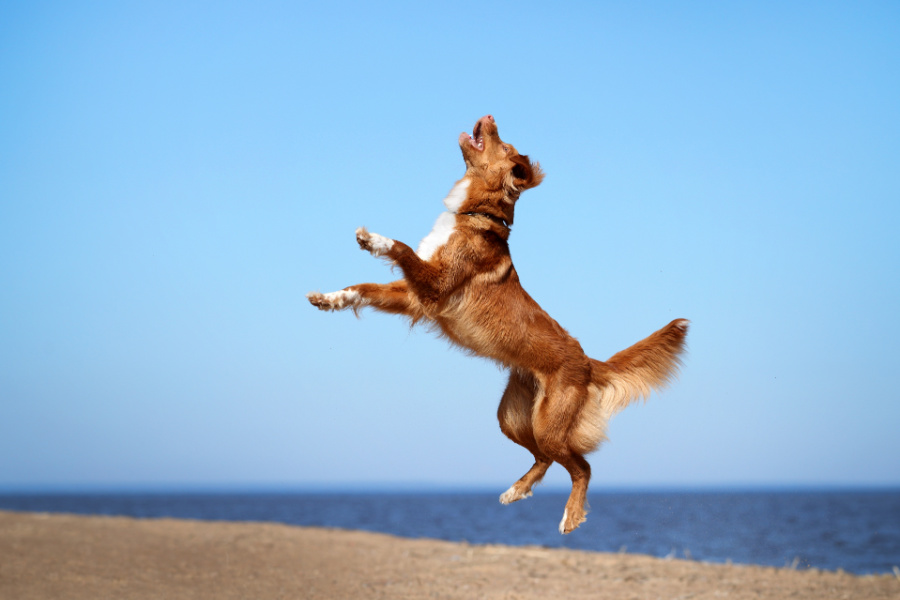A common concern among new puppy owners is, “My dog is so hyper—how can I help him calm down?” Your lively new companion might be bursting with energy, have a very short attention span, and seem unable to settle no matter how many walks, runs, or play sessions you have.
This energetic behaviour could simply be a sign of a normal, playful, and active dog—or it might indicate an underlying issue that needs attention for everyone’s happiness and harmony. Some animal experts liken these behaviours to those seen in children with ADHD (Attention Deficit Hyperactivity Disorder) or ADD (Attention Deficit Disorder). But can dogs actually have ADHD or ADD?
The answer isn’t straightforward. While high energy is common in many dogs, behaviours that resemble ADD or ADHD might actually be linked to a rare condition called Hyperkinesis. Let’s explore the differences and what they mean for your pup.
Is my dog just high-energy, or could it be Hyperkinesis?

It’s perfectly normal for puppies and certain breeds—like Border Collies, German Shepherds, and Sheepdogs—to be highly energetic. This level of activity alone usually isn’t cause for concern; it often just means your dog is a naturally busy and active pup.
Before bringing a dog into your home, it’s important to be realistic about how much time and energy you can devote. Dogs need plenty of physical exercise and mental stimulation to stay happy and healthy!
When puppies or newly adopted dogs arrive, they’re often curious and eager to explore—sometimes a bit too much so! But as they grow and mature, both their bodies and minds change. Typically, their hyperactive behaviors lessen, especially when they have consistent structure and training. If your dog’s overactive behavior continues well beyond puppyhood, it may be time to consult your veterinarian to rule out any underlying medical or behavioral concerns.
One rare cause of persistent hyperactivity is Hyperkinesis, a neurodevelopmental disorder where a dog reacts excessively to stimuli in ways that don’t match their age or environment. Some signs of Hyperkinesis might make owners wonder if their dog has ADHD-like symptoms.
Which dog breeds are more prone to ADD or ADHD-like behaviors?
Your dog’s breed, age, and gender can all influence the likelihood of exhibiting ADD or ADHD-like traits. Some breeds are naturally more energetic and driven due to their original roles, which can make these behaviors more noticeable.
For example, breeds like Border Collies, Retrievers, Labs, Siberian Huskies, and Terriers were bred to be active working dogs, used to plenty of physical exercise and mental challenges. Without enough outlets to burn off their energy, these dogs can become restless or hyperactive. Remember the old saying: a tired dog is a happy dog!
Hyperactivity is often more common in male dogs and younger pups, especially those who spend long periods alone or isolated from social interaction. Lack of attention and stimulation can lead to frustration, stress, and acting out.
Other factors can also trigger excitable behavior. For instance, living in a household with energetic or excitable people—especially children—can influence a dog’s impulses. Young kids might not always know how to handle a dog’s unexpected energy or behavior, and their reactions can unintentionally increase the dog’s hyperactivity. Since dogs are very sensitive to the energy around them, staying calm and composed yourself can help. Rewarding calm behavior in your dog encourages them to match your mood.
How Can You Tell if Your Dog Has ADHD or Hyperkinesis?
Now that you understand the difference between a naturally energetic dog and one with Hyperkinesis, here are some signs to help you determine where your dog’s behavior falls.
Common signs and indicators of Hyperkinesis may include:
- Excessive, frantic activity that seems uncontrollable
- Frequent panting, even when not overheated
- Increased salivation without obvious cause
- Rapid heartbeat (tachycardia)
- Struggles with training or following commands
- Difficulty adjusting to new or everyday environmental stimuli
If your dog shows several of these signs consistently, it may be time to consult your vet for further evaluation.
How Does Canine Hyperactivity Differ from ADHD in Humans?
ADHD in people is often seen in young children and adults who struggle with paying attention, and who display hyperactivity and impulsive behavior. It can also affect self-discipline and lead to challenges in social situations, like difficulty reading social cues. Similarly, puppies need structure and guidance to grow into happy, well-adjusted members of the family. New dog owners must develop effective training skills and confidence because if a dog senses your anxiety, it can actually reinforce their hyperactive behavior.
Diagnosing Hyperkinesis at Your Vet
Before jumping to conclusions about ADD or ADHD-like symptoms in your dog, consider these questions:
- Is my dog a naturally high-energy breed?
- Does my dog get enough exercise?
- Are there enough enrichment activities to keep my dog mentally stimulated?
- Have I dedicated sufficient time to properly train my dog?
- Is my dog’s response to situations appropriate, or does it seem exaggerated?
If your dog is getting plenty of exercise and mental stimulation, but the hyperactive behavior continues, it might be time to consult your vet. A proper diagnosis can only be made by a professional. If your vet suspects Hyperkinesis, they may perform a test involving a stimulant administered under supervision. During this test, the vet will monitor your dog’s heart rate, breathing, and any behavioral changes. Based on your dog’s response, the vet can determine if Hyperkinesis is present.
Keep in mind that while ADHD-like behaviors are fairly common in dogs, a true diagnosis of Hyperkinesis is very rare.
What Else Could Be at Play? Recognizing Canine Compulsive Disorder
Veterinary experts have also identified a condition called Canine Compulsive Disorder (CCD), which is similar to Obsessive-Compulsive Disorder (OCD) in humans.
CCD causes dogs to engage in extreme repetitive behaviors, such as chasing their tail, sucking their flanks, spinning in circles, or barking excessively. While some of these actions may seem normal for a lively, young dog, CCD is typically diagnosed when these behaviors become uncontrollable and persistent.
Breeds like Dobermans, Bull Terriers, and German Shepherds appear to have a genetic predisposition to CCD. However, like ADD or ADHD-like symptoms, these compulsive behaviors can also be triggered by factors such as insufficient physical exercise, anxiety, or frustration stemming from a lack of attention from their owners.
If you suspect your dog may have CCD, it’s important to consult your vet for proper testing. Treatment often involves medication and behavior modification training. For more specialized support, pet owners might also consider working with a veterinary behaviorist, who can help identify compulsive behaviors and provide guidance on how to effectively redirect your dog’s energy.
How Do You Treat a Dog with Hyperactivity or Hyperkinesis?
There’s no one-size-fits-all approach to managing a hyperactive dog. Your vet will consider various factors specific to your dog and may recommend anything from lifestyle changes and specialized training to medication options. If you suspect your dog has a medical or behavioral condition, it’s always best to consult your vet for an accurate diagnosis and a tailored treatment plan that meets your dog’s unique needs.
Can Dogs Take ADD or ADHD Medication?
Medication is rarely the first step when addressing ADD or ADHD-like behaviors in dogs. Often, improvements come from holistic changes such as adjusting diet, providing mental enrichment, increasing exercise, and consistent training.
If your vet diagnoses true Hyperkinesis, medication might become part of the treatment. Any prescribed medication should be given exactly as directed and stored safely to avoid accidental ingestion or overdose. Always keep medications sealed and out of reach, especially for curious pets.

Can Training Help with ADHD or Hyperkinesis?
Whether your dog has Hyperkinesis or is simply bursting with energy, these tips can help improve their behavior and quality of life:
- Establish a routine: Schedule daily structured walks and outdoor playtime.
- Increase training: Teach your dog commands like waiting for food or sitting calmly before walks.
- Reward good behavior: Use treats or praise to reinforce positive actions such as coming when called.
- Exercise together: Play fetch, visit dog parks, and let your dog socialize and burn off energy.
- Consider advanced training: Specialized programs can teach you and your dog how to manage hyperactive behaviors effectively.
- Avoid rewarding excited greetings: Ignore your dog when they jump or act hyper; only give attention once they’ve calmed down.
- Provide mental stimulation: Use interactive toys and puzzles that encourage chewing and cognitive engagement.
What About Diet?
Dogs thrive on consistency, so feeding them at the same time each day helps maintain routine. A balanced, high-quality diet low in fillers and additives supports overall well-being. Some sources suggest diet changes might help with ADD or ADHD symptoms, but research is inconclusive. Always consult your vet before making dietary adjustments.
Most Importantly – Be Patient and Understanding
Pets bring us so much joy, but they also need our attention, socialization, and love. Dogs with hyperactivity or Hyperkinesis require extra care, training, exercise, and comfort to thrive as happy family members. Commitment, patience, and creativity are key to helping them succeed. If you ever feel unsure or overwhelmed, don’t hesitate to seek guidance from your vet.





.svg)

.svg)


